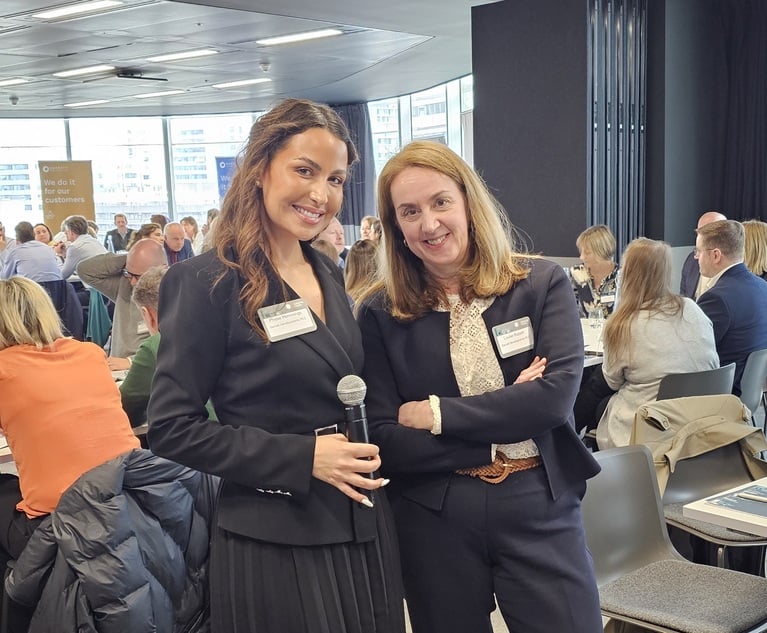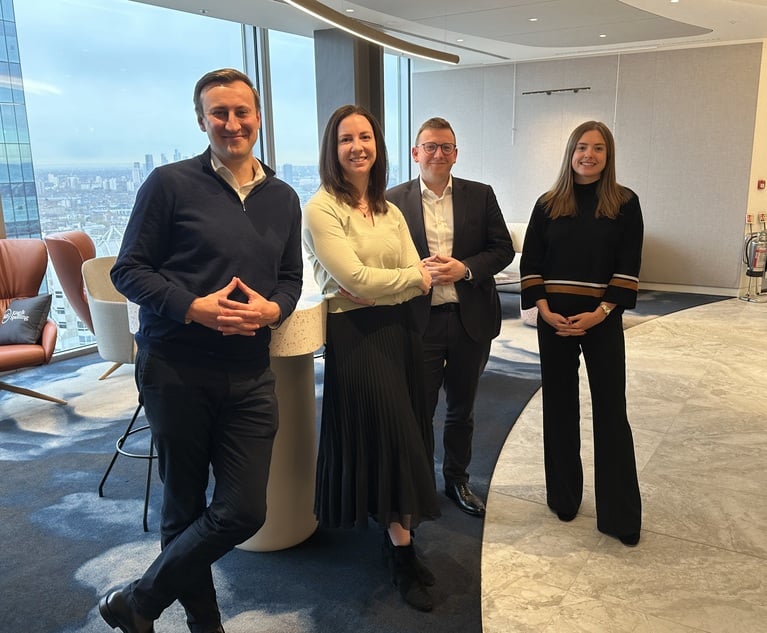 Emrys Moore, RPC
Emrys Moore, RPC"I Face Barriers Daily" - RPC Trainee Shares Journey As A Non-Binary, Trans Person
"Sadly, some of the people who vocally and visibly hold hostile views are among us in the legal industry," says Emrys Moore.
June 25, 2020 at 04:00 AM
5 minute read
As part of our series for Pride month, Emrys Moore, a trainee solicitor at RPC due to qualify in September 2020, speaks about his experiences as a non-binary, transgender man working in the legal profession. He is Stonewall Charity's Role Model of the Year for the South West region.
I first came out as bisexual when I was 22 and as transgender at 25. My gender identity has meant I face personal and professional barriers daily.
The legal profession has a reputation for being fairly traditional, inflexible and resistant to change. While progress is being made, acceptance of transgender people is lagging behind. I hope by sharing stories like mine that I can help this catch up.
Growing up, I was quite the tomboy and in hindsight it was fairly obvious that I was a trans man. However, I had no frame of reference for this until recently, so I just assumed everyone felt like that to some extent. My only reference for someone female bodied who presented masculine was a butch lesbian, but I'm bisexual so that wasn't right.
For a long time, I did not know that transgender people existed, beyond the offensive caricature of trans women as a "man in a dress" I had seen on television.
This all changed when I spoke to trans people, via LGBT+ social groups in Bristol. They spoke of that disjointed wrongness and called it gender dysphoria. For me, dysphoria feels like radio static made up of many thoughts, overlapping to the point that they all drown each other out.
Without any framework for understanding it, all I could make out was that overall feeling that something didn't quite fit and it was distressing. Learning about gender dysphoria and euphoria gave me a direction to explore, places to start to try and turn down the static rather than just ignoring it.
This wasn't an overnight process, but a series of smaller realisations. I read, listened to and spoke about transgender people's experiences of transitioning, the terms they used to describe their gender and how they realised they were transgender. With supportive friends, I tried on masculine clothes, pronouns and names until I found what fit best.
Transition is costly, emotionally and financially, so I hoped each step in the right direction would be the last one I needed to take. Despite supportive friends, family and colleagues and the funds to access medical transition privately to avoid the years long wait for NHS treatment, I was still terrified.
Transitioning has improved my life immeasurably. Before I came out, I had very little energy and was extremely anxious as I feared "giving myself away". I hardly recognise today that person as me, as I am now open and vocal about being transgender and queer.
Visibility is important, as I did not think as a queer transgender person that I could be a successful lawyer, because I did not see it. Paying forward the work done to educate me, by educating others and using my relative privilege to make things better for others, drives me.
The consultation for potential changes to the Gender Recognition Act has significantly raised the profile of anti-transgender views. This has led to an increase in harassment of people who are perceived to be transgender, whether they are or not.
"LGBT+ voices should be centred in discussions of the issues which affect them directly"
Sadly, some of the people who vocally and visibly hold hostile views are among us in the legal industry. This has impacted the way I live my public life. I am extremely wary of using bathrooms or going to events where I don't know the venue, or disclosing I am transgender in some circumstances.
It is a lack of understanding of the negative treatment we face that is one of the main barriers in further progressing LGBT+ inclusion in the legal profession. The other, is that it often falls to LGBT+ people to ask for that change.
LGBT+ voices should be centred in discussions of the issues which affect them directly. However, this also gets extended to LGBT+ people having to make or demand the space for those issues to be discussed in the first place. This can entrench an adversarial, rather than collaborative approach and adds barriers to those who already face more.
It is therefore important that diverse voices are encouraged to speak up and that explicit space is made for them to be heard. Against a background of negative treatment, it is not enough to be neutral. For their own safety, people will be careful and assume that people are not supportive unless they show that they are.
No single person is representative of the group they belong to, whether it is the wider LGBT+ community or a one letter from the acronym. While barriers do overlap, progress for the most privileged in the group can mask a lack of progress for those who face more barriers. Intersectionality is vital and part of this is recognising the gaps in our own knowledge.
I am immensely grateful that many people at all levels of seniority are becoming more aware of the gaps in their own knowledge and more pro-active in keeping an open mind, being willing to listen, learn and challenge their unconscious biases. In my view, that's how we make progress — by all of us being open to listening and learning.
|Read More
"The Fear Of Being Discovered Was Crippling" – One Gay Man's Experience Of Being Out at Work
This content has been archived. It is available through our partners, LexisNexis® and Bloomberg Law.
To view this content, please continue to their sites.
Not a Lexis Subscriber?
Subscribe Now
Not a Bloomberg Law Subscriber?
Subscribe Now
NOT FOR REPRINT
© 2024 ALM Global, LLC, All Rights Reserved. Request academic re-use from www.copyright.com. All other uses, submit a request to [email protected]. For more information visit Asset & Logo Licensing.
You Might Like
View All

'I Won’t Name the Firm, But...'—Barratt Redrow's Legal Head on External Counsel Red Flags


Ex-Spies Reveal How Cybercriminals Exploit Law Firms’ Holiday Vulnerabilities
5 minute readTrending Stories
- 1'It's Like They Lynched You:' Law Professor's Discrimination Claim Reaches High Court
- 2New Teeth for Anti-SLAPP Statute? Absolute Immunity for Union Grievance Proceedings
- 3Freeman Mathis & Gary Taps Orlando for Third New Florida Office This Year
- 4On The Move: Moore & Van Allen Adds Finance Partner From Morris Manning
- 5Navigating the Storm: Pulling Through a Crisis When ‘the Worst’ Is Over (Part 2)
Who Got The Work
Michael G. Bongiorno, Andrew Scott Dulberg and Elizabeth E. Driscoll from Wilmer Cutler Pickering Hale and Dorr have stepped in to represent Symbotic Inc., an A.I.-enabled technology platform that focuses on increasing supply chain efficiency, and other defendants in a pending shareholder derivative lawsuit. The case, filed Oct. 2 in Massachusetts District Court by the Brown Law Firm on behalf of Stephen Austen, accuses certain officers and directors of misleading investors in regard to Symbotic's potential for margin growth by failing to disclose that the company was not equipped to timely deploy its systems or manage expenses through project delays. The case, assigned to U.S. District Judge Nathaniel M. Gorton, is 1:24-cv-12522, Austen v. Cohen et al.
Who Got The Work
Edmund Polubinski and Marie Killmond of Davis Polk & Wardwell have entered appearances for data platform software development company MongoDB and other defendants in a pending shareholder derivative lawsuit. The action, filed Oct. 7 in New York Southern District Court by the Brown Law Firm, accuses the company's directors and/or officers of falsely expressing confidence in the company’s restructuring of its sales incentive plan and downplaying the severity of decreases in its upfront commitments. The case is 1:24-cv-07594, Roy v. Ittycheria et al.
Who Got The Work
Amy O. Bruchs and Kurt F. Ellison of Michael Best & Friedrich have entered appearances for Epic Systems Corp. in a pending employment discrimination lawsuit. The suit was filed Sept. 7 in Wisconsin Western District Court by Levine Eisberner LLC and Siri & Glimstad on behalf of a project manager who claims that he was wrongfully terminated after applying for a religious exemption to the defendant's COVID-19 vaccine mandate. The case, assigned to U.S. Magistrate Judge Anita Marie Boor, is 3:24-cv-00630, Secker, Nathan v. Epic Systems Corporation.
Who Got The Work
David X. Sullivan, Thomas J. Finn and Gregory A. Hall from McCarter & English have entered appearances for Sunrun Installation Services in a pending civil rights lawsuit. The complaint was filed Sept. 4 in Connecticut District Court by attorney Robert M. Berke on behalf of former employee George Edward Steins, who was arrested and charged with employing an unregistered home improvement salesperson. The complaint alleges that had Sunrun informed the Connecticut Department of Consumer Protection that the plaintiff's employment had ended in 2017 and that he no longer held Sunrun's home improvement contractor license, he would not have been hit with charges, which were dismissed in May 2024. The case, assigned to U.S. District Judge Jeffrey A. Meyer, is 3:24-cv-01423, Steins v. Sunrun, Inc. et al.
Who Got The Work
Greenberg Traurig shareholder Joshua L. Raskin has entered an appearance for boohoo.com UK Ltd. in a pending patent infringement lawsuit. The suit, filed Sept. 3 in Texas Eastern District Court by Rozier Hardt McDonough on behalf of Alto Dynamics, asserts five patents related to an online shopping platform. The case, assigned to U.S. District Judge Rodney Gilstrap, is 2:24-cv-00719, Alto Dynamics, LLC v. boohoo.com UK Limited.
Featured Firms
Law Offices of Gary Martin Hays & Associates, P.C.
(470) 294-1674
Law Offices of Mark E. Salomone
(857) 444-6468
Smith & Hassler
(713) 739-1250









